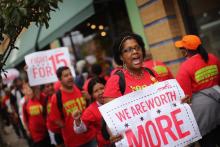May
4
2015

Written by Sean Thomas-Breitfeld
This blog was originally posted on DEMOS‘ PolicyShop Blog.
Two weeks ago, New York City joined ten other states and municipalities in banning the use of credit checks in hiring. Like most forms of 21st century discrimination, weighing the credit histories of job applicants seems innocuous and race-neutral at first glance. But, as a Demos report found, people of color end up being at a serious disadvantage because they are more likely to have fair or poor credit. The decades of Black people first not having access to credit, and then being targeted by bad actors in the lending industry is one of many examples of how the historic and ongoing exclusion of African Americans from economic opportunity is inextricably linked to the quality of the lives lived by Black people today.
Credit checks are one of many barriers faced by Black job seekers; and the implicit biases of employers have proved hard to legislate. Research has raised public consciousness about the ways discrimination is still baked into our systems. For instance, recent studies have shown that when people review identical resumes, an applicant’s name, skin color, and even whether they use the terms “Black” or “African American” can make a difference in their chances of being hired. One study found that, when given otherwise identical resumes, employers offered jobs to Black applicants with no criminal record at a rate as low as white applicants with criminal records. This research proving inequity in hiring practices exists has been hugely important for advocates taking on the employment and wealth gap. But it also takes organizing and movements to address injustices – from hiring practices to the criminal justice system – that limit and determine the course of far too many people’s lives.
The #BlackLivesMatter movement has sparked a national discussion about the specific impacts of anti-Black racism on the daily lives of people of African descent in the U.S. This rallying cry is not just about resisting violence and death at the hands of those charged with protecting communities, it is also about the ability of Black people to create a better future and finally realize the American Dream. #BlackLivesMatter renewed the spirit of Black activism, and inspired a new report that lifts up community organizing as they key strategy for changing the systems and structures that maintain black social, political, and economic inequity.
The #BlackWorkersMatter report unveils the harsh economic reality that leaves Black communities in a permanent recession, and also highlights the grassroots organizing happening around the country to build the political power of Black workers. One of the policy issues that Black worker organizing groups are focusing on is the barrier to employment faced by people with criminal records. Just as credit checks perpetuate institutional barriers faced by Black workers, so do questions about conviction history on job applications. The criminalization of Black people – due to the failed war on drugs and the militarization of policing – has led to huge disparities in incarceration rates of Black men especially. But leveling the field for people with criminal convictions is not only a “Black issue.”
When grassroots “ban the box” campaigns force employers to consider a job candidate’s qualifications first, without the stigma of a criminal record, Black communities certainly benefit. So too do the one out of every three American adults with a criminal record. Organizing to challenge the particularities of anti-Black racism is necessary to address the disparities and inequities faced by Black people. It is also part of the larger project of making the economy work for everyone. Still, the lingering racialized impacts of public policy can’t be overlooked. Even after dealing with specific barriers like credit and criminal background checks, our country will have to address the particular barriers faced by Black workers that have compounded the nearly universal problems of low-wages, high debt, and a stagnant economy (at least for the 99%). That’s why groups organizing Black workers are focused on changing policy, challenging bias, and building new economic models that spread the wealth across all of our communities.
